Welcome to DU!
The truly grassroots left-of-center political community where regular people, not algorithms, drive the discussions and set the standards.
Join the community:
Create a free account
Support DU (and get rid of ads!):
Become a Star Member
Latest Breaking News
General Discussion
The DU Lounge
All Forums
Issue Forums
Culture Forums
Alliance Forums
Region Forums
Support Forums
Help & Search
General Discussion
Related: Editorials & Other Articles, Issue Forums, Alliance Forums, Region ForumsGreat News for Whiskey Drinkers!
http://motherjones.com/blue-marble/2012/03/great-news-whiskey-drinkers
Celtic Renewables founder Martin Tangney does his best mad whiskey scientist. Image by Celtic Renewables.
A confession: When I wrote about the environmental footprint of various kinds of booze a while back, I was really hoping that whiskey would turn out to be the greenest. That's because it's far and away my favorite alcoholic beverage, whether served on the rocks in a comfy bar or sipped from a flask, campfire-side. What I found, though, is that the production of whiskey and other spirits requires much more energy than wine or beer. This is especially true in boutique distilleries that use old-fashioned pot-style stills, which make delicious whiskey but are pretty inefficient when it comes to energy use. The distilling process also makes a lot of waste. I found myself ruing the day I ever looked into all this. Who wants to feel guilty about booze, for goodness sake?
Imagine my delight, then, when I learned about a Scottish startup that is poised to make whiskey production greener. Celtic Renewables has figured out how to ferment whiskey waste and turn it into biofuel, along with two other useful products.
Advertise on MotherJones.com
Here's how it works: To make Scotch whiskey, you take barley, separate out the sugar, add water and yeast, and ferment it. The result is similar to beer. The next step is to distill the alcohol from that beer in pots. Set it to age in wooden casks, and a few months later, you have whiskey.
The problem is that the process creates a lot of byproduct: First there are the remains of the barley, called draff. And when you distill the alcohol, you're left with a liquid called pot ale, which is hard to dispose of because it contains biological components that can acidify ecosystems, along with traces of copper that are leached from the pots. Celtic Renewables makes a soup out of the pot ale and draff. Then—through a fuel-making fermentation process that was developed during the leadup to World War I but fell out of favor when it couldn't compete with petroleum—the company converts the stuff into biobutanol fuel, animal feed, and acetone.
InfoView thread info, including edit history
TrashPut this thread in your Trash Can (My DU » Trash Can)
BookmarkAdd this thread to your Bookmarks (My DU » Bookmarks)
9 replies, 2071 views
ShareGet links to this post and/or share on social media
AlertAlert this post for a rule violation
PowersThere are no powers you can use on this post
EditCannot edit other people's posts
ReplyReply to this post
EditCannot edit other people's posts
Rec (6)
ReplyReply to this post
9 replies
 = new reply since forum marked as read
Highlight:
NoneDon't highlight anything
5 newestHighlight 5 most recent replies
= new reply since forum marked as read
Highlight:
NoneDon't highlight anything
5 newestHighlight 5 most recent replies
Great News for Whiskey Drinkers! (Original Post)
xchrom
Mar 2012
OP
Whiskey drinkers will be fine with it...as long as there's still Whiskey in the Jar
pinboy3niner
Mar 2012
#2
a kennedy
(29,661 posts)1. Sounds good to me....
pinboy3niner
(53,339 posts)2. Whiskey drinkers will be fine with it...as long as there's still Whiskey in the Jar
longship
(40,416 posts)3. Ay coundna shed bedder... hic
FSogol
(45,485 posts)4. Sounds like we all need to drink more whiskey!
Blue Owl
(50,374 posts)6. Whiskey Tangney Foxtrot
How neat is that?
vanbean
(990 posts)7. Great News?
The news is that it is still ethanol. A terrible drug, that cannot be disguised by ads with cars, pretty women, adventure, or by bubbles in the bottle. A few months ago, I wouldn't have written this or approved of another person writing it. I learned the hard way and I have been cured of a long-time addiction to the drug. I was lucky in that regard.
Whiskey was my favorite form of ethanol. I would be wrong not to warn of the dangers of this harmful substance. I wish I could successfully help others to keep from injesting ethanol. If your liver could send the message via pain to your brain of the way ethanol burns it, nobody would drink it more than once.
morningfog
(18,115 posts)9. I still would.
FarCenter
(19,429 posts)8. Distillation of spirits is energy inefficient, and it led to the "Gin Epidemic" in Northern Europe
http://www.artoftheprint.com/artistpages/hogarth_william_ginlane.htm
The northern European population probably had less tolerance for alcohol than the southern wine drinking cultures, even though they did drink fairly prodigous quantities of beer (3 liters per day?).
When distillation of beer produced whiskey, gin, and other spirits, alcholoism became epidemic.
Normally, intestinal flora produce about an ounce of ethanol per day, so nobody is a teetotaller.
The northern European population probably had less tolerance for alcohol than the southern wine drinking cultures, even though they did drink fairly prodigous quantities of beer (3 liters per day?).
When distillation of beer produced whiskey, gin, and other spirits, alcholoism became epidemic.
Normally, intestinal flora produce about an ounce of ethanol per day, so nobody is a teetotaller.